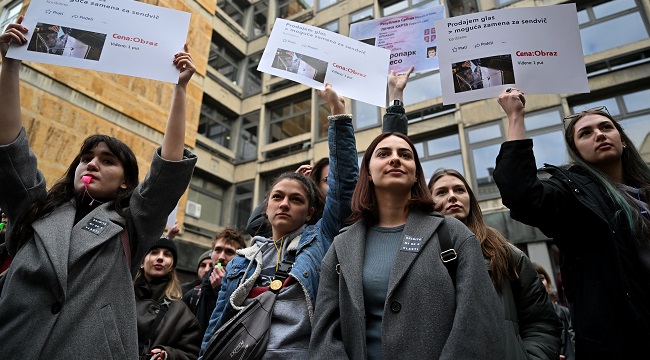After parliamentary and local elections on December 17, she took to the streets again to protest what she believes is a fraudulent poll orchestrated by President Aleksandar Vucic, a former Milosevic ally.
In 2000, 17-year-old activist Marta Manojlovic was severely beaten by police outside Belgrade city hall. Twenty-three years later, she saw history repeat itself as security forces again used batons against demonstrators.
Manojlovic was a member of “Otpor” — a student-led movement instrumental in toppling strongman Slobodan Milosevic, who headed Serbia during its 1990s wars against Croatia, Bosnia and Kosovo.
She was peacefully carrying a flag with a clenched fist, the symbol of resistance against Milosevic’s authoritarian regime, when the police rounded her up.
“One of the policemen hit me with a baton on my shoulder, I fell down and I think some seven of them had beaten me,” Manojlovic told AFP.
She lost consciousness and sustained 12 stitches on her head, bruised ribs and haematomas all over her body. Manojlovic took 10 days to recover — but to this day has not let go of the flag.
– On the streets again –
After parliamentary and local elections on December 17, she took to the streets again to protest what she believes is a fraudulent poll orchestrated by President Aleksandar Vucic, a former Milosevic ally.
Vucic’s right-wing Serbian Progressive Party won roughly 46 percent of votes in the parliamentary elections, while the leading opposition coalition secured 23.5 percent, according to official results.
Vucic — a former nationalist turned pro-European Union populist — has been criticised his alleged autocratic grip on Serbia.
On Sunday evening, Manojlovic was among thousands of protesters in front of Belgrade city hall demanding the vote be annulled.
Some tried to storm the building and broke windows with flagpoles and rocks, while the police responded with pepper spray and dispersed the crowd using batons.
“History repeats itself in the worst way possible,” Manojlovic told AFP.
“My experience told me that conflict was inevitable… so I left just before the clashes started.”
Afterwards, she saw images of police beating up young people.
“I felt terrible. This country continues the devour the best people it has, ones that love it the most,” Manojlovic said.
“We again, unfortunately, live in an autocracy.”
International observers — including representatives from the Organization for Security and Co-operation in Europe (OSCE) — reported “irregularities” in the election, including “vote buying” and “ballot box stuffing”.
Several Western countries have also expressed concern.
Vucic has denounced the protests, saying there was evidence the violence had been planned in advance and suggested that foreign actors were trying to stir up unrest.
– Student movements –
Manojlovic’s generation grew up taking to the streets to demand democracy.
Her parents protested against Milosevic’s autocratic regime when she was just a child. “Otpor” (Resistance) quickly became very popular with Serbian youths and mobilised them for a final showdown that toppled Milosevic.
The current protests are also led by university and high school students united under the “Borba” (Fight) movement which also uses a stylised clenched fist as its symbol.
The movement was formed after the elections from an informal group, “Students Against Violence”, that echoed the name of the country’s main opposition camp, “Serbia Against Violence”.
The movement underscores it is not linked to political parties.
Some of Borba’s members are proud to wear their parents’ protest memorabilia, like Otpor pins, flags and banners.
“I was born in 2002, and I regret that a democratic transition did not take place then,” Emilija Milenkovic, a politics student, said.
– ‘Tolerating stabilocracy’ –
During the 1990s, Milosevic’s Serbia became a pariah state over its role in bloody wars that tore apart the former Yugoslavia. His regime was roundly condemned and isolated by the international community.
Vucic however enjoys external political support and and several EU leaders congratulated him personally for the election win despite the fraud allegations.
Political analyst Aleksandar Popov said protests against Vucic cannot succeed without the support of democratic countries.
“They are still tolerating stabilocracy… and this is where you can see the hypocrisy of the West, especially when they speak about human rights and rule of law,” Popov told AFP.
“They don’t care about… sky-high corruption, collapsed institutions, suppressed human rights and stolen elections.”





































Great read! The authors perspective is really interesting. Looking forward to more discussions. Check out my profile!